Gut Health Vitamins vs Probiotics: Do You Need Both?
Find out the difference between gut health vitamins and probiotics. Learn if you should be taking both for a balanced gut.

Gut health vitamins and probiotics are two essential products you can opt for in large measures to improve your health and comfort level of digestion. Each category has its benefits and formulation for various health needs, influencing well-being and investment. Knowing the difference in effectiveness, ingredient quality, and side effects will give you the best option to decide about your digestive problems.
With Nudge, you’ll get a clear comparison of gut health vitamins and probiotics, helping you make an informed choice. Nudge’s Anti Flare-Up Formula uniquely improves gut motility by 25%, breaks down hard-to-digest FODMAPs, and replenishes essential vitamins and minerals often deficient in IBS sufferers. With stress-balancing ingredients like ashwagandha, Nudge also reduces cortisol levels to curb inflammation, offering a holistic approach to digestive health.
This guide compiles extensive research to aid your decision-making regarding gut health vitamins and probiotics for your health goals. We’ll explore effectiveness, convenience, possible side effects, and long-term benefits so you can choose wisely. By the end, you’ll have a clearer understanding of how each option can continue to impact your digestive health and comfort daily.
Let’s dive in!
Understanding Gut Health Vitamins
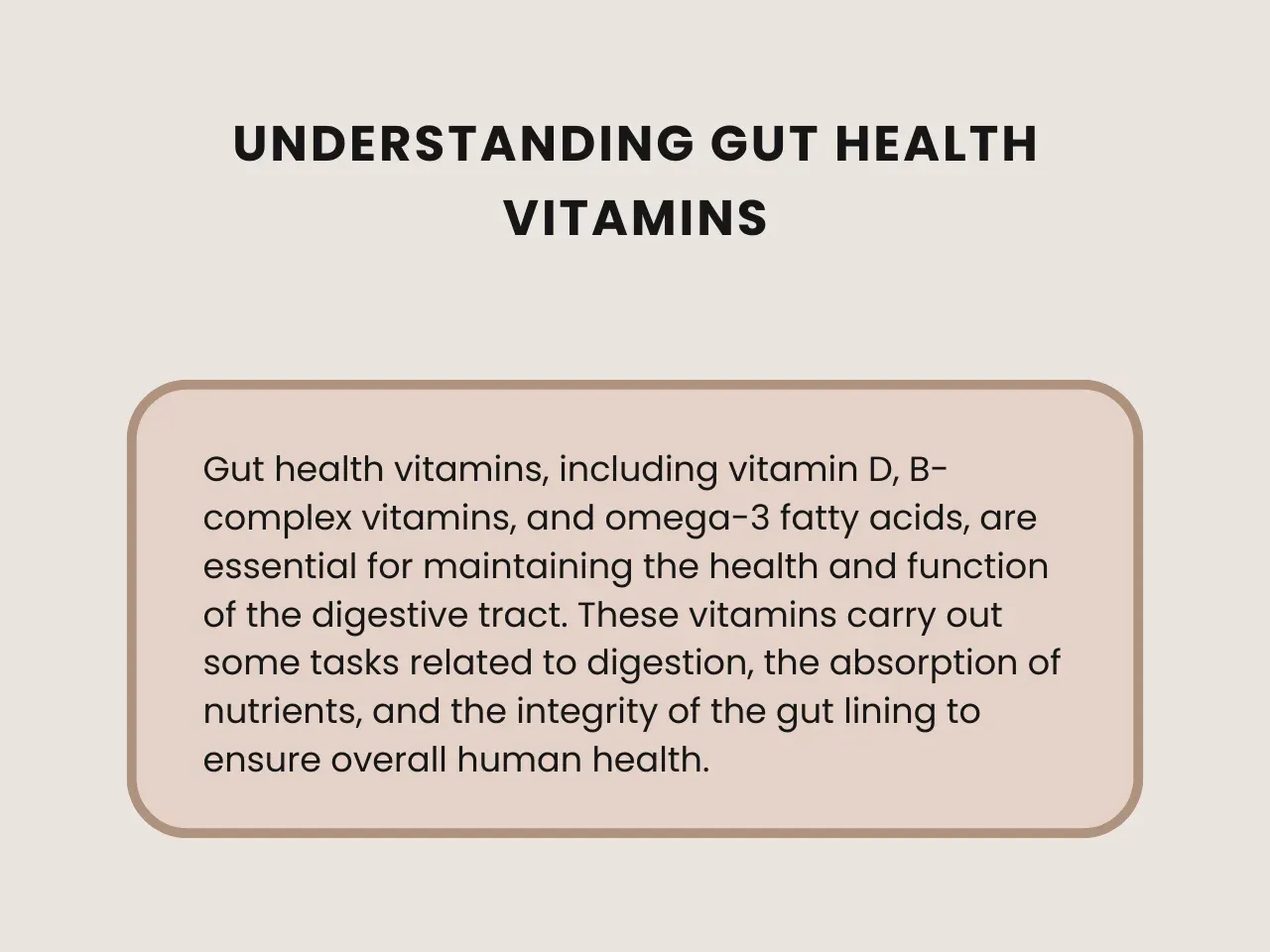
Gut health vitamins, including vitamin D, B-complex vitamins, and omega-3 fatty acids, are essential for maintaining the health and function of the digestive tract. These vitamins carry out some tasks related to digestion, the absorption of nutrients, and the integrity of the gut lining to ensure overall human health.
How Do These Vitamins Support Gut Function?
Good gut health is considered crucial for overall well-being, and vitamins do not take a backseat in this regard either. After all, these nutrients will promote digestion, fortify nutrient absorption, and support the structural integrity of the gut lining, including the GI tract. Learn how adding the correct dose of gut health vitamins to your diet can empower digestive health and foster a healthy gut environment.
- Digestive Enzymes: The body needs some vitamins, especially B-complex vitamins, especially thiamine (B1), riboflavin (B2), niacin or nicotinic acid (B3), and pyridoxine (B6), to manufacture digestive enzymes that break down food into available nutrients. These enzymes facilitate metabolic processes by ensuring the proper breakdown of carbohydrates, proteins, and fats, which is especially important for individuals experiencing bowel syndrome or other digestive issues.
- Nutrient Absorption: Some gut health vitamins, such as Vitamin D, assist in absorbing gut-friendly minerals like calcium and magnesium. Omega-3 fatty acids, with their anti-inflammatory properties, enhance nutrient absorption and reduce inflammation in the gut. This supports a healthy digestive process and helps alleviate symptoms associated with conditions like acid reflux.
- Gut-Lining Health: Vitamins like vitamin A and butyrate—a short-chain fatty acid derived from soluble fiber—maintain gut lining integrity. Vitamin A supports healthy mucosa, while butyrate is viewed as an energy source for colon cells to help regenerate and keep the gut barrier.
- Balancing Gut Microbiome: Certain gut health vitamins, like vitamin K, contribute to the development of beneficial bacteria in the gut. Promoting a diverse microbiome enhances gut function, digestion, and immune health, making it crucial for preventing dysbiosis, which can lead to digestive disorders.
- Antioxidant Support: Vitamins such as Vitamin C and Vitamin E function as potent antioxidants that help fight oxidative stress in the gut. These gut health vitamins reduce inflammation and protect cells from damage, maintaining a healthy digestive environment where your gut functions at its best.
Filling Nutritional Gaps
These may include certain fruits, vegetables, and whole grains, particularly a balanced diet that maintains gut health. However, nutritional gaps can occur either due to dietary restrictions, food choices that a person makes, or even health conditions, which can cause issues with digestive function and overall well-being, including irritable bowel syndrome.
These deficiencies can be supplemented through diet, and the body can get all the nutrients required for optimum gut performance. Adding these gut health vitamins to one's diet can support digestive health and promote overall wellness.
What Are Probiotics and How Do They Work?
Probiotics are living organisms often described as "good bacteria" that help establish a healthy gut balance. They naturally occur in foods such as yogurt, kefir, sauerkraut, kimchi, and dietary supplement forms. Probiotics are crucial in maintaining or reestablishing the natural gut microbiome, essential for overall gut health and well-being.
How Do Probiotics Work?
Probiotics are vital to gut health and strike a terrific balance between microbiome and digestion. These good gut bacteria improve digestion, offer anti-inflammatory benefits, enhance immune support, and complement general fitness. Check out how adding probiotics to your daily regimen provides transformational experiences.
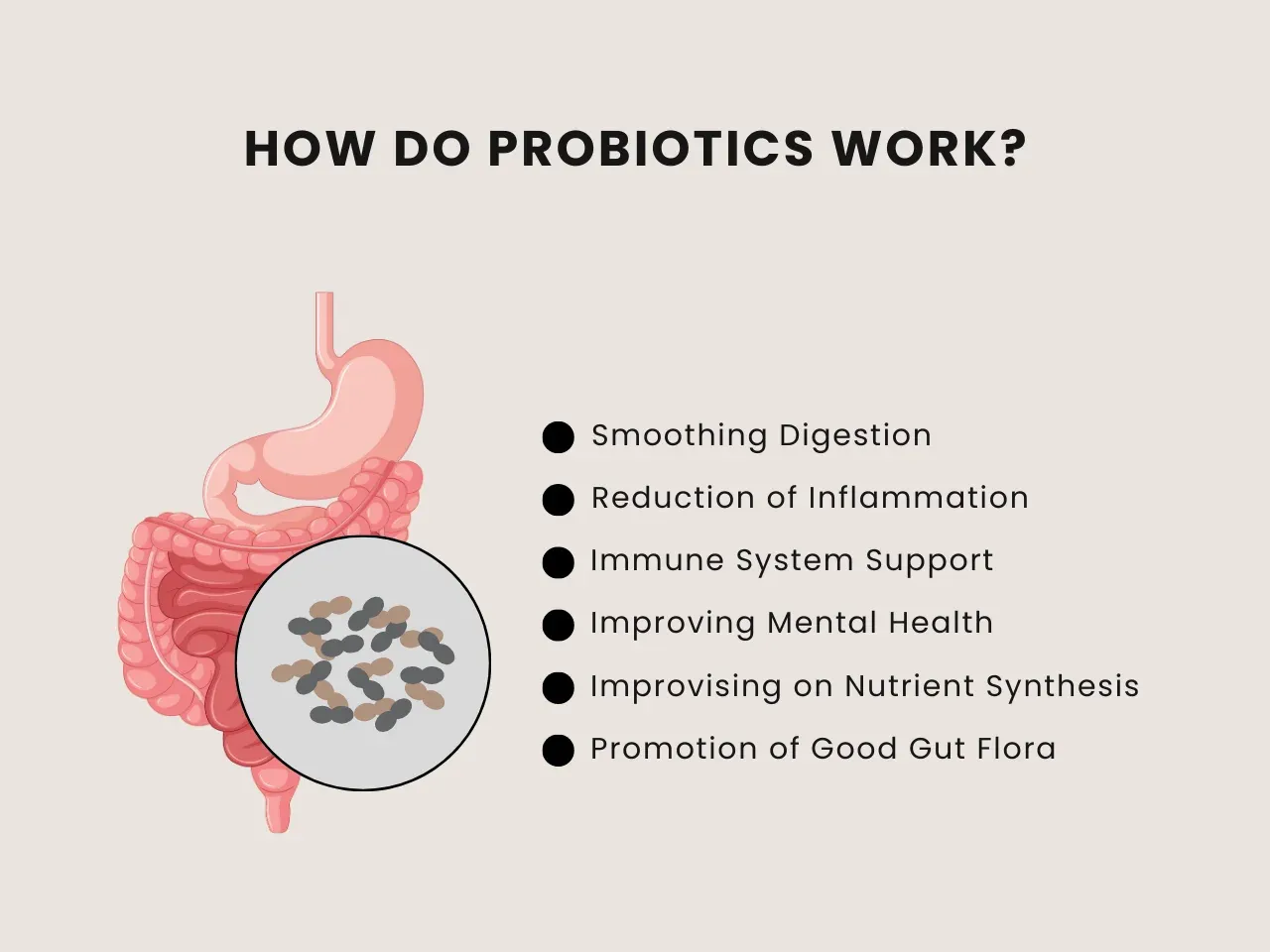
- Smoothing Digestion: Probiotics help with digestion and nutrient absorption by increasing the activity of digestive enzymes. They also help develop a good gut environment, smoothing the action of digestion, which reduces symptoms such as bloating, gas, and constipation. This primarily benefits individuals with inflammatory bowel disease or irritable bowel syndrome.
- Reduction of Inflammation: Another added advantage of probiotics is that they modulate the immune system's response and reduce inflammation in the gut. Hence, they can prevent dysbiosis by competing for nutrition and space with pathogenic bacteria, creating a more stable microbial environment.
- Immune System Support: The gut houses many of the immune systems. Probiotics support immune function by enhancing the production of protective antibodies and immune cells that help to protect against infection and disease.
- Improving Mental Health: Emerging research suggests a connection between gut health and mental well-being, often called the gut-brain axis. Probiotics may help alleviate symptoms of anxiety and depression by influencing neurotransmitter production and reducing inflammation.
- Improvising on Nutrient Synthesis: Probiotics can help synthesize specific essential gut health vitamins and nutrients, including selected B vitamins and vitamin K. These are very important in energy metabolism and blood coagulation, further contributing to overall health.
- Promotion of Good Gut Flora: Probiotics establish and maintain a diverse, well-balanced gut microbiome. Such diversity is critical to healthy digestion because it builds a robust defense against pathogenic attack and supports the diverse metabolic processes in the gut.
Different Strains of Probiotics and Their Benefits
Different types of probiotic strains have particular benefits for gut health and overall well-being. Knowing the specific functions of these strains helps an individual choose appropriate types of probiotics. The following are some of the familiar strains of probiotics and their respective tasks in supporting digestive health.
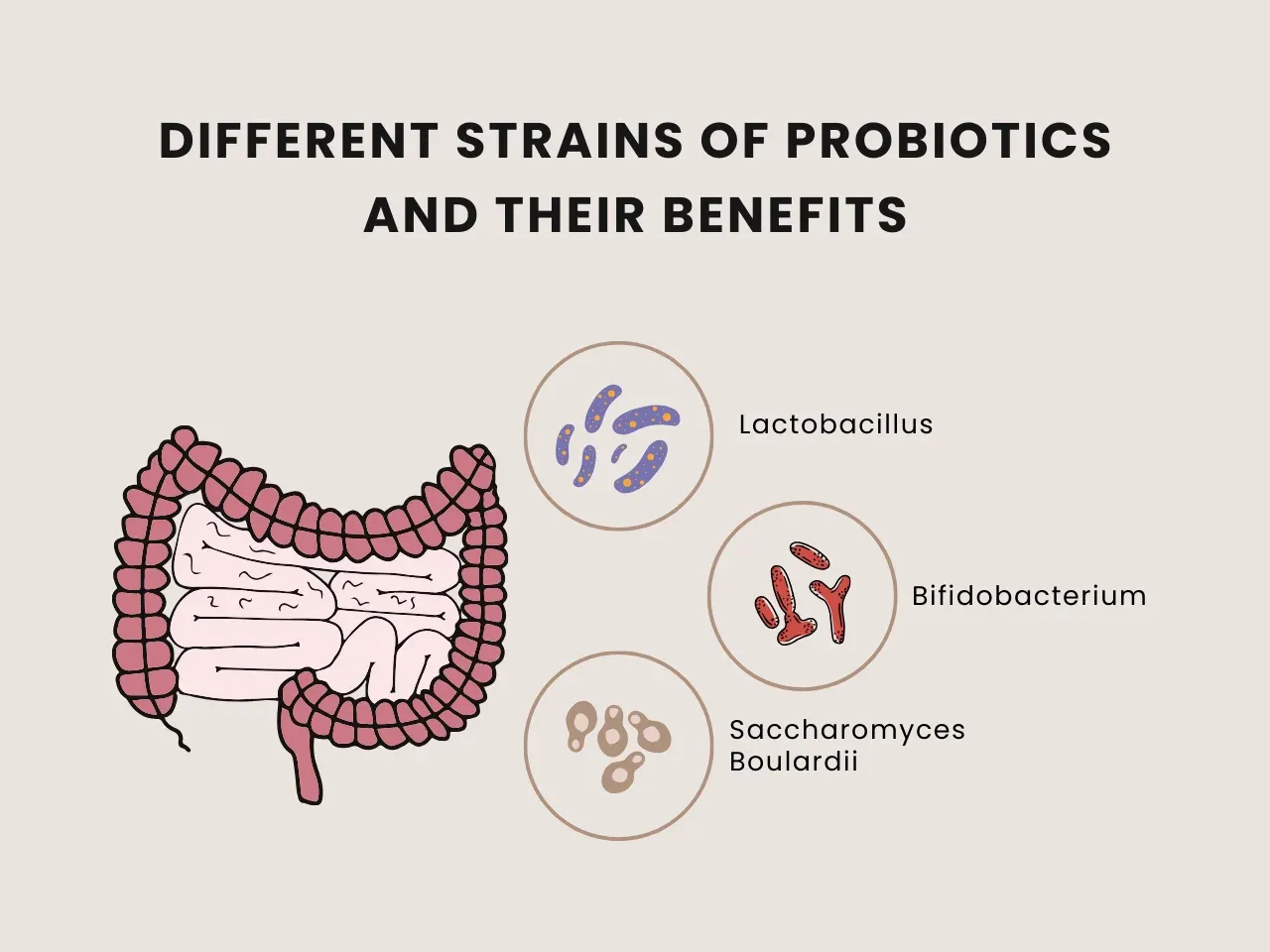
- Lactobacillus: This is one of the most common strains found in probiotics. It helps lactose digestion, decreases diarrhea, and is effective for those with IBS. Lactobacillus supports gut barrier integrity and may enhance immune function.
- Bifidobacterium: Bifidobacterium strains effectively maintain gut health in infants and adults. They help ferment dietary fiber and enhance nutrient absorption, which postpones constipation. Besides, Bifidobacterium has been associated with improved immune responses and reduced gastrointestinal disorders.
- Saccharomyces Boulardii: It represents one of the yeast strains that has successfully managed antibiotic-associated diarrhea and lowered the incidence of traveler's diarrhea. It maintains gut health through a balanced gut microbiota.
Incorporating a probiotic supplement into your daily routine can significantly enhance your gut health, bolster your immune system, and even support skin health. By understanding the potential benefits and specific strains of probiotics, you can make informed choices that align with your health goals.
Do You Need Both for Optimal Gut Health?
After all, optimal gut health often requires striking a balance between gut health vitamins and probiotics since they fulfill different yet complementary roles in digestive function. Following are some considerations to take to the next level by incorporating better digestion with improved overall well-being:
The Role of Gut Health Vitamins
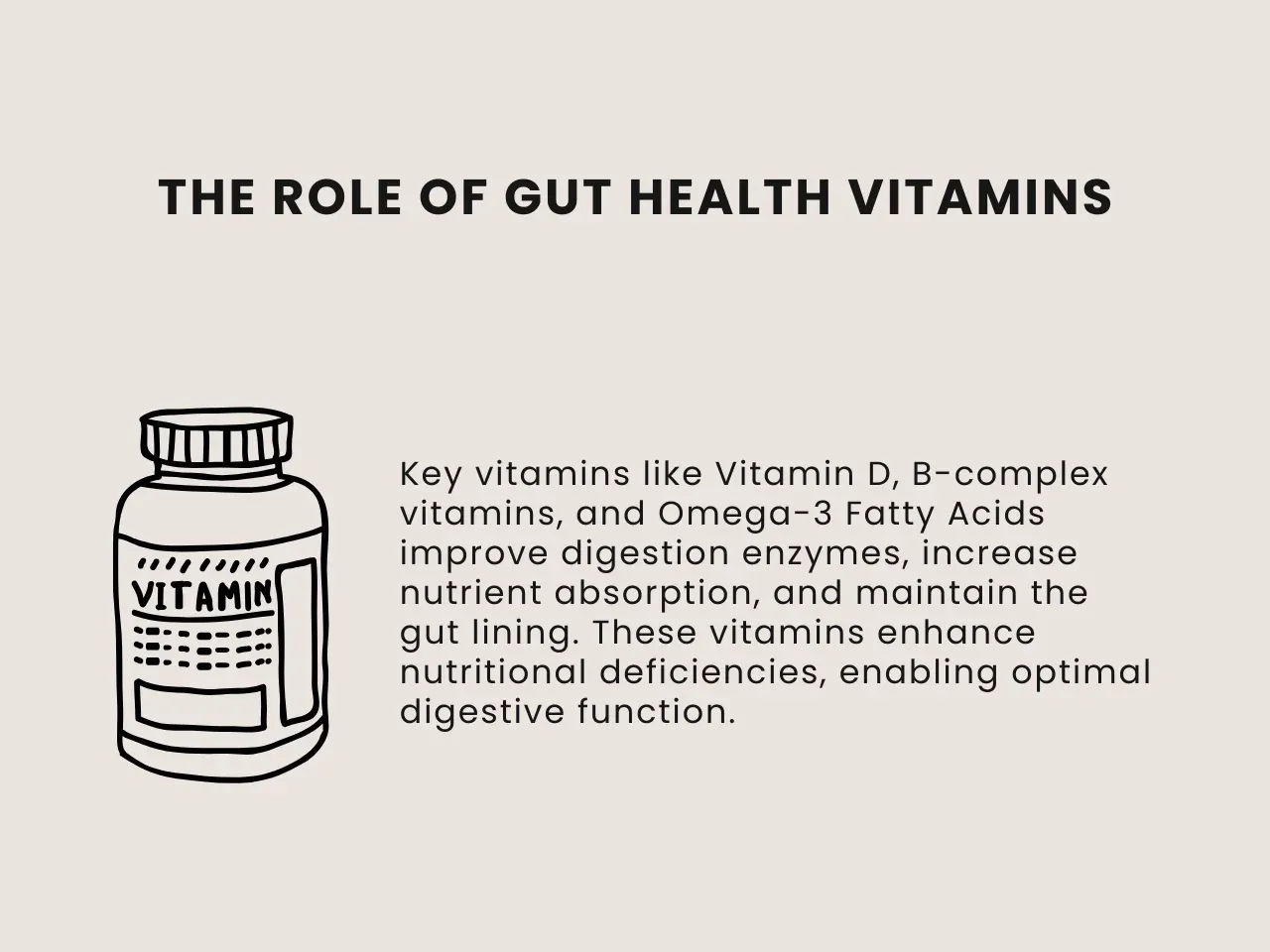
Vitamins for gut health are essential in delivering nutrients to the digestive system. Principal vitamins like Vitamin D, B-complex vitamins, and Omega-3 Fatty Acids improve digestion enzymes, increase nutrient absorption, and maintain the gut lining intact. These gut health vitamins enable the digestive system to work optimally by enhancing nutritional deficiencies.
Beyond digestive health benefits, gut health vitamins support a healthy immune system and provide anti-inflammatory effects. These advantages highlight the importance of including these vitamins in your diet to maintain overall health and promote good digestive health. Adequate vitamin intake can benefit those with conditions like lactose intolerance or abdominal pain.
The Role of Probiotics
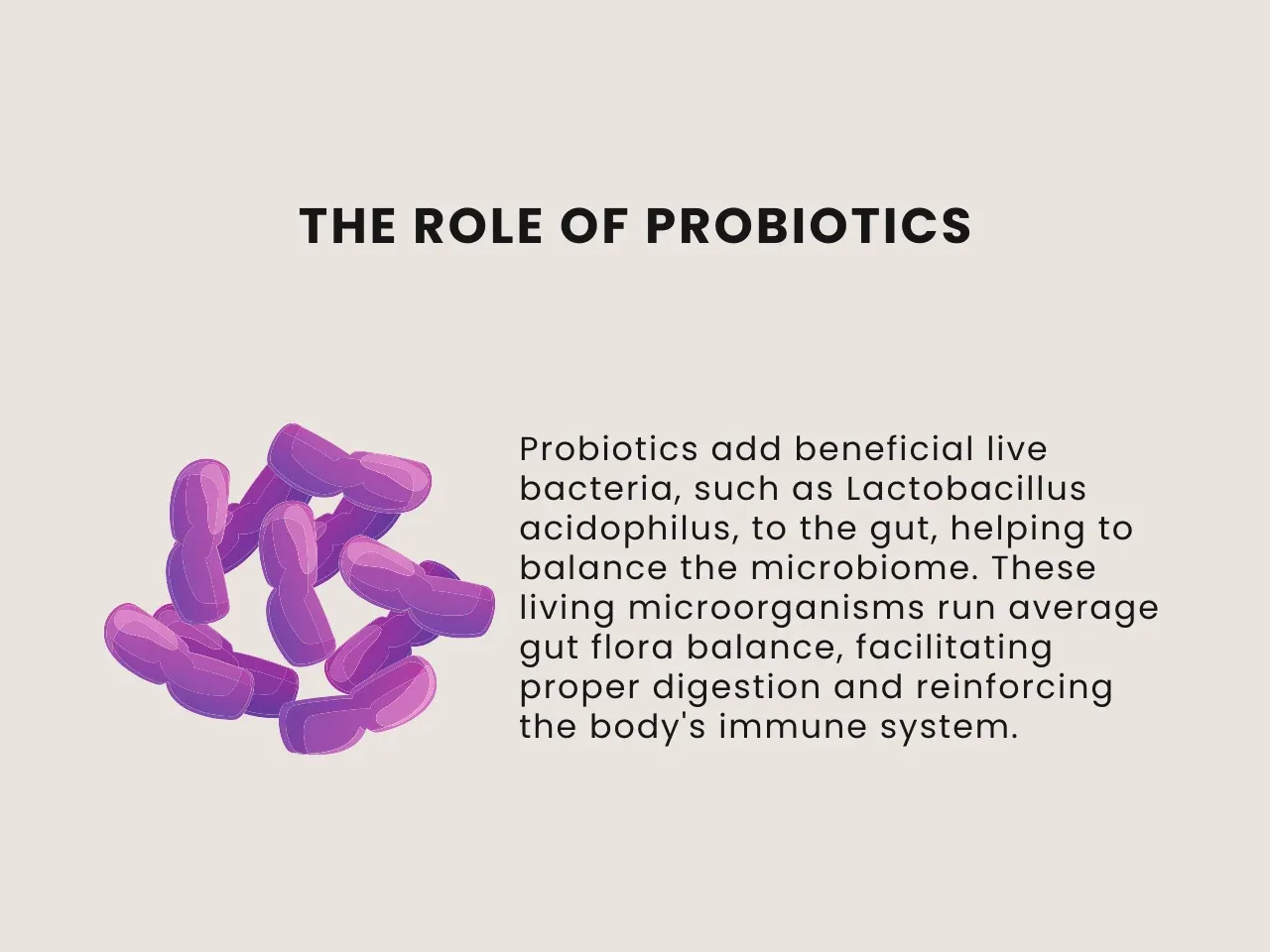
On the other hand, probiotics introduce helpful live bacteria, like Lactobacillus acidophilus, into the gut, which helps balance the microbiome. These living microorganisms run average gut flora balance, facilitating proper digestion and reinforcing the body's immune system. Probiotics enhance gut diversity and function, addressing small intestinal bacterial overgrowth (SIBO) and preventing complications such as yeast infections.
The right probiotics can support the body against harmful contaminants and improve overall health, especially for those experiencing digestive discomfort. Different strains of probiotics introduced into the gut will create a strong gut environment, keeping harmful bacteria at bay while moving one toward a healthier digestive system. For instance, specific probiotic strains can help regulate blood sugar levels, providing additional support for metabolic health.
A Balanced Approach
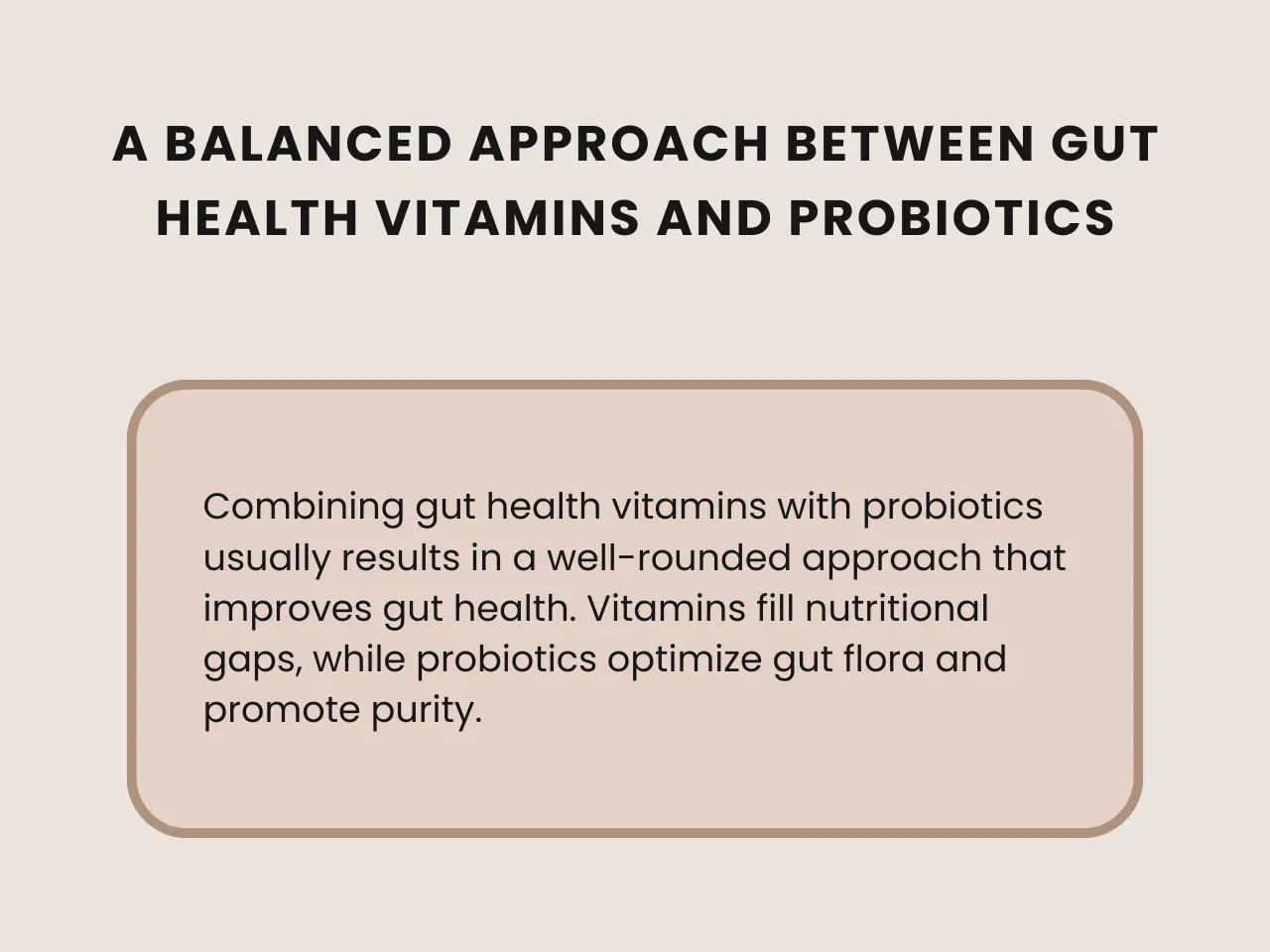
Combining gut health vitamins with probiotics creates a balanced approach that significantly improves gut health. Vitamins provide essential nutrients that support overall digestion, helping to fill any gaps in nutrition that may result from dietary restrictions or specific health conditions. Meanwhile, probiotics optimize gut flora, promoting ingredient purity and functionality.
Such a two-pronged approach will ensure digestive efficiency is at its maximum, promote immune function, and improve general well-being. With gut health vitamins and probiotics integrated into one's health regimen, one can build a complete support system against gut problems for a more resilient and balanced environment.
Individual Needs and Health Goals
Each person's gut health needs can vary greatly depending on their diet, health goals, and any existing gut conditions. For example, those with dietary restrictions could use an extra vitamin dose to fill some nutritional gaps. Others would need to focus more on probiotics for correcting the gut microbiome imbalance.
The best way to determine which combination of gut health vitamins and probiotics will be the most functional for specific health goals is through your registered dietitian or healthcare professional. Prioritizing ingredient lists and ensuring ingredient purity can further enhance the safety of probiotics, making them a beneficial addition to your health routine.
Key Takeaway
The difference between gut health vitamins and probiotic forms will help you determine how to manage digestive well-being. Each possesses its benefits, and knowing what each offers can facilitate the right choice based on your needs. Gut health vitamins can contain nutrients like vitamin D, B12, and zinc, which are essential for overall digestive functioning and immunity. They help your body stay balanced and reduce inflammation in the gut.
For healthy people, these vitamins are vital in maintaining optimal gut health. Probiotics are live microorganisms that help create and balance a healthy gut microbiome while enhancing digestion. They can also assist with bloating, gas build-up, and irregular bowel movements.
Still trying to decide whether to prioritize gut health vitamins or probiotics? Let Nudge offer personalized insights to help you make the best choice for your digestive health. Discover how our tailored recommendations can enhance your well-being, allowing you to take control of your digestive comfort and overall health.